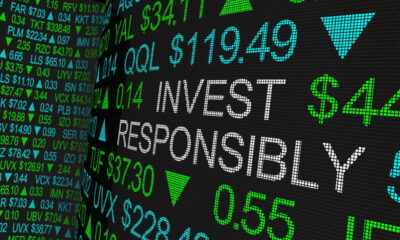Features
The future of ethical investment
Sustainability fund expert, Clare Brook, takes a close look at the strategies being adopted by ethical fund managers.
Interest in ethical and sustainable investment has grown in lock-step with consumer interest in fair trade, organic and locally sourced food, recycling, alternative energy and other green initiatives. The movement has been further fuelled by reaction to corporate scandals, the role of large banks in the credit crunch and, most recently, the BP oil spill.
Some investors wanted to do more than just avoid companies doing things they disapproved of; they wanted to invest in companies that were actively making the world a better place. So the ‘socially responsible investment’ movement grew up in the early 1990s to enable just that.
The trouble was that, back then, not many companies were “pure plays” on environmental or social protection. Increasingly complex ratings systems and strategies were devised to justify investing in larger companies. Investors managing UK only funds, especially, found the number of genuinely environmentally or socially responsible companies available to them extremely limited.
These days the top 10 holdings of a sample of UK ethical funds nearly all contain HSBC, Tesco and Vodafone. And quite a few contain BP, Shell and BHP Billiton. While none of these companies is directly involved in nuclear power, tobacco, animal testing or pornography, it would be stretching a point to say they were solving the world’s problems. At best, they might be said to be adapting to the challenges of climate change and human rights issues by improving their environmental, social and governance (ESG) performance and employing ever larger corporate social responsibility (CSR) departments to convince investors and other stakeholders of their credentials.
Investors who are baffled by the complexity of different terms around ethical, socially responsible and sustainable investing, the Holden & Partners Guide to Climate Change and Ethical Investing is an invaluable tool. It lists the top 10 holdings of every fund in the ethical, socially responsible and climate change sector, which is by far the best way of seeing at a glance whether a fund chimes with an investor’s values.
 The good news for investors is that a new phase in ethical/socially responsible investment is emerging. Called either “sustainable” or “climate change” investment, it began as the science and economics around climate change became more widely accepted. The publication of the Stern Report in 2006 was critical in convincing policy-makers and financiers that climate change is a real threat to our future existence; that it will cost the global economy a huge amount to rectify and so a significant amount must be spent on its prevention; and that a range of solutions to the problem already exist in products and services offered by well-managed, profitable companies.
The good news for investors is that a new phase in ethical/socially responsible investment is emerging. Called either “sustainable” or “climate change” investment, it began as the science and economics around climate change became more widely accepted. The publication of the Stern Report in 2006 was critical in convincing policy-makers and financiers that climate change is a real threat to our future existence; that it will cost the global economy a huge amount to rectify and so a significant amount must be spent on its prevention; and that a range of solutions to the problem already exist in products and services offered by well-managed, profitable companies.
This made possible a new breed of specialist investment fund focusing on investing in solutions to climate change as well as the accompanying problems of waste disposal and water resource shortages. Forestry and agriculture funds have also performed particularly well over the last year, according to Holden & Partners. Yet, the investment strategy of all these funds is global, because the UK environmental industry remains woefully small in terms of quoted companies compared with the US, China and much of Europe.
 WHEB Asset Management focuses its fund on three themes that stem from the main challenges facing humanity over the next few decades: climate change and energy, global water shortages and an ageing population. It invests only in companies whose business is driven primarily by at least one of these themes. As a result, the fund invests in companies which are tackling serious global challenges head-on.
WHEB Asset Management focuses its fund on three themes that stem from the main challenges facing humanity over the next few decades: climate change and energy, global water shortages and an ageing population. It invests only in companies whose business is driven primarily by at least one of these themes. As a result, the fund invests in companies which are tackling serious global challenges head-on.
The prospects for “sustainable” funds look better than ever. Even if there is a lack of coordinated global action to tackle climate change, the pace of legislative change on a national and state level is picking up all over the world and creating a background that is more supportive for the environmental economy. Meanwhile, worldwide water shortages (and floods) underline the need for improved management of this limited resource.
Also boosting the situation worldwide are the stimulus packages aimed at kick-starting the environmental economy. Energy efficiency measures attract a substantial portion of the global stimulus package. HSBC estimated last year that the green stimulus package amounted to $521bn to be spent globally over five years. By October 2010 $194bn of this had been deployed (over half of it by China) – the majority going on energy-efficiency projects, including upgrading national grids, building efficiency, insulation and lighting.
Sectors such as water, energy efficiency and alternative energy have compelling growth outlooks over the next few years, too, though valuations, for the most part, are still way off their 2007 highs.
So the would-be ethical or sustainable investor can now choose from an interesting range of funds focused on companies that provide solutions for the world’s gravest challenges. At the same time, such funds offer investors the chance to pursue a truly ethical investment strategy because their investments will help to secure the existence of future generations.
Clare Brook is Co-Fund Manager of the IM WHEB Sustainability Fund whebam.com


 Environment12 months ago
Environment12 months agoAre Polymer Banknotes: an Eco-Friendly Trend or a Groundswell?

 Features11 months ago
Features11 months agoEco-Friendly Cryptocurrencies: Sustainable Investment Choices

 Features12 months ago
Features12 months agoEco-Friendly Crypto Traders Must Find the Right Exchange

 Energy11 months ago
Energy11 months agoThe Growing Role of Solar Panels in Ireland’s Energy Future





























